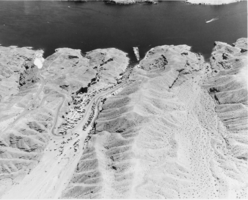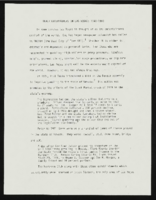Search the Special Collections and Archives Portal
Search Results

Film transparency of Nelson's Landing, Nevada, before September 14, 1974
Date
Archival Collection
Description
Image
Henderson Public Library Photograph Collection on Henderson, Nevada
Identifier
Abstract
The Henderson Public Library Photograph Collection on Henderson, Nevada (approximately 1940-1988) depicts life and growth in Southern Nevada. The collection documents the growth of Henderson, Nevada through images of Basic Magnesium Incorporated, housing throughout the area, and events. The documentation of Basic Magnesium Incorporated, its activites, personnel, and buildings from 1942 through 1944 is prominent in this collection.
Archival Collection
Murphy, Franklin M., 1898-1957
Consulting geologist and surveyor Franklin Mac Murphy was born on December 27, 1898 in Wheaton, Minnesota. He studied at Columbia University, the University of Arizona, and the University of California, Los Angeles, completing his graduate studies in 1930 at the California Institute of Technology, in Pasadena, California.
Person
Jones, Clifford Aaron, Sr., 1912-2001
Nevada Lieutenant Governor Clifford "Cliff" Jones was born in Long Lane, Missouri in 1912. While he was attending the University of Missouri in 1931, his family moved to Las Vegas, Nevada. During summer breaks from college Jones worked alongside his brother, Herbert, on the construction of the Boulder (Hoover) Dam. Jones moved to Las Vegas in 1937 after he became an attorney.
Person
Rivera, Erma Linda, 1952-
Erma Linda Rivera was born in Morenci, Arizona, in 1952. In the Las Vegas Valley, where Linda has lived for over twenty years, she has promoted educational opportunities for youth, particularly in the Hispanic community. Both she and her husband moved from Montana, where her husband worked as a power plant operator on Yellowtail Dam, to southern Nevada to work on Hoover Dam in 1986. Linda was put in charge of the affirmative employment plan for her branch of the Bureau of Reclamation.
Person

Pearl Busch oral history interview
Identifier
Abstract
Oral history interview with Pearl Busch (born 1936 in Winona, Minnesota) conducted by Laura Busch on March 20, 1978 for the Ralph Roske Oral History Project on Early Las Vegas. Pearl first describes her original move to Southern Nevada and a wide range of topics including the first hotels on the Strip, the growth and expansion of the city, recreational activities such as skiing, and her family. She also discusses gambling and its impact on the city, the clubs and organizations to which she belonged, and her appreciation for the mild Las Vegas climate. The interview finalizes with her thoughts on the biggest excitement Las Vegas offers, her input on the high crime rate in Las Vegas, and her thoughts on the energy crisis and the future of solar energy in Las Vegas.
Archival Collection

"Black Entertainers in Las Vegas in the Era of Segregation 1940-1960": manuscript draft by Roosevelt Fitzgerald
Date
Archival Collection
Description
From the Roosevelt Fitzgerald Professional Papers (MS-01082) -- Unpublished manuscripts file.
Text

Don Perry interview, March 05, 1978: transcript
Date
Archival Collection
Description
On March 5th, 1978, Karen Croteau interviewed Don Perry (b. 1928 in Clarksburg, West Virginia) about Paiute Indians and life on a reservation. Perry begins by mentioning his own Indian heritage with a Cherokee mother and his wife’s Paiute heritage. Perry focuses on his conversations with his wife’s grandmother, who lived on the Paiute reservation since birth, from who he learned about the reservations history. He particularly delves into the traditions of Indian burials, governing on the reservation, and the difference between an Indian reservation and an Indian colony. Additionally, he talks about recreation on the reservations, education of Paiute Indians, and how reservations have changed. Throughout the interview, Perry gives personal anecdotes about his life in connection to the Paiute people and his experiences with their traditions and belief systems. Perry ends by discussing governing politics of the Paiute reservation and the start of Las Vegas as a gambling town.
Text
